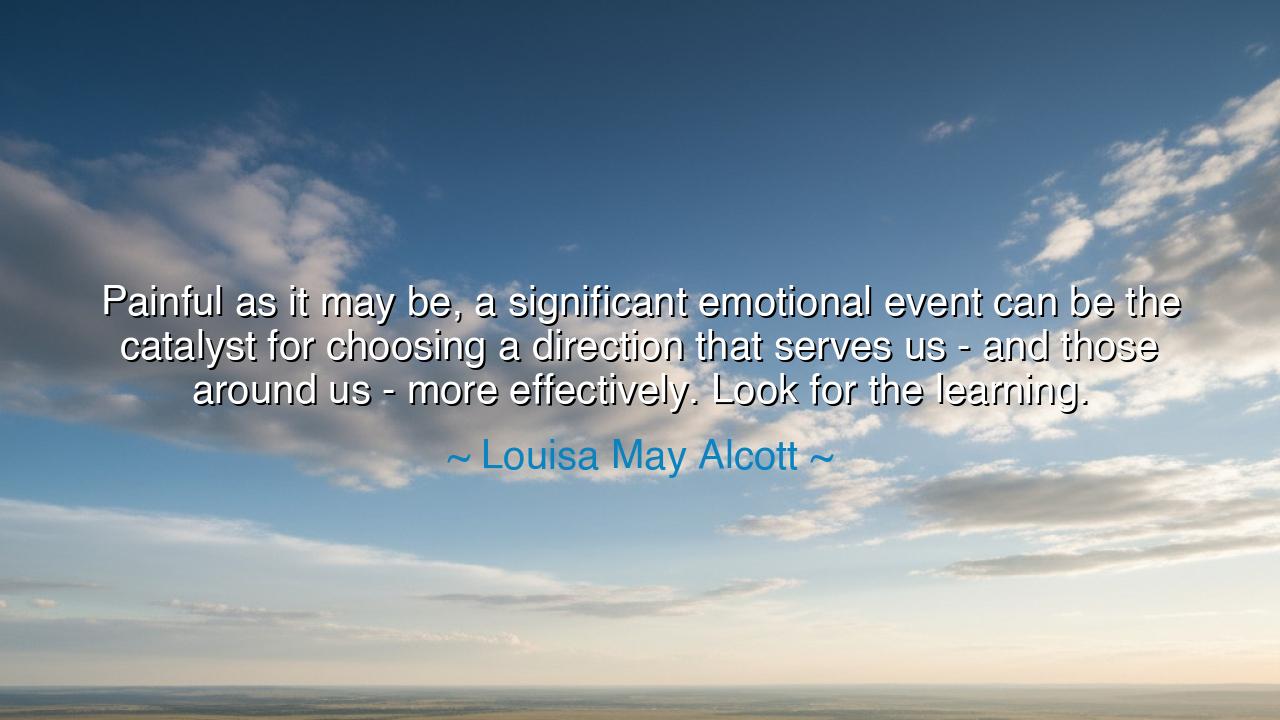
Painful as it may be, a significant emotional event can be the
Painful as it may be, a significant emotional event can be the catalyst for choosing a direction that serves us - and those around us - more effectively. Look for the learning.






“Painful as it may be, a significant emotional event can be the catalyst for choosing a direction that serves us — and those around us — more effectively. Look for the learning.” — Louisa May Alcott
In this radiant declaration, Louisa May Alcott, the wise chronicler of human hearts, offers a truth forged in the furnace of suffering. Her words echo through time like a bell of awakening: that pain, though bitter, is not our enemy, but our teacher; that through the shattering of the heart, new paths are revealed. The ancients spoke of such moments as trials of the soul — crucibles where one’s truest self is formed. To Alcott, who endured illness, poverty, and war, this was no mere sentiment; it was hard-earned wisdom. She knew that a significant emotional event — loss, heartbreak, failure — often arrives not to destroy us, but to push us toward a higher purpose.
When the heart breaks, something deeper awakens. Pain tears away the veil of illusion and forces us to confront what truly matters. In those moments, we stand naked before life — vulnerable, uncertain, yet capable of transformation. Alcott calls these moments catalysts, for they ignite change, redirecting the course of our existence. What once seemed unbearable becomes the very energy that propels us forward. As a blacksmith’s fire tempers the sword, so suffering tempers the spirit. To reject the pain is to reject the lesson; but to face it, to look for the learning, is to discover wisdom hidden within the wound.
Consider the story of Victor Hugo, the great author of Les Misérables. When he was exiled from his beloved France, stripped of honor and position, he fell into despair. Yet in that solitude, cut off from everything he loved, he began to write his greatest works. His painful emotional event — his exile — became the catalyst for his transformation from a celebrated writer into a prophet of humanity. He learned, through loss, to see the world not as a poet of glory, but as a champion of compassion. Thus, through anguish, he served others more deeply than he ever could in comfort.
So too did Louisa May Alcott live this truth. As a nurse during the Civil War, she witnessed suffering beyond imagination — the cries of the wounded, the agony of the dying. It marked her deeply, leaving scars on her body and soul. Yet out of that pain came her masterpiece, Little Women, a work that has healed and inspired generations. Her pain became a bridge for others’ healing; her emotional trial, the soil from which compassion grew. She learned to see that suffering, when met with courage and understanding, refines the heart and clarifies one’s purpose.
To look for the learning is to turn the gaze inward, to ask not “Why did this happen to me?” but “What is this trying to teach me?” Every sorrow contains a seed of insight — a message from life itself. Those who can perceive it rise wiser and gentler; those who cannot remain trapped in bitterness. The difference lies not in the pain endured, but in the meaning chosen. Even the heaviest grief can be transformed into light when we use it to deepen empathy, to expand understanding, and to guide others who suffer as we once did.
The ancients would say that such transformation is the path of the heroic soul — to journey through the valley of shadow and return with the flame of wisdom. Like the phoenix that burns to ashes before it is reborn, so must the heart endure its trials before it can soar anew. Pain is the purifier, experience the teacher, and wisdom the treasure unearthed. To deny this cycle is to remain unformed; to embrace it is to become whole.
Thus, the lesson of Alcott’s words is clear: when pain visits you — as it must visit all who live — do not curse it or flee. Sit with it. Listen to it. Ask what it has come to teach. Let your significant emotional events become your catalysts, shaping you into one who not only survives, but serves. In time, you will see that your suffering was not the end of your story, but the beginning of your becoming. For the one who learns from pain gains a wisdom that can heal the world — and that, perhaps, is the greatest lesson of all.






AAdministratorAdministrator
Welcome, honored guests. Please leave a comment, we will respond soon